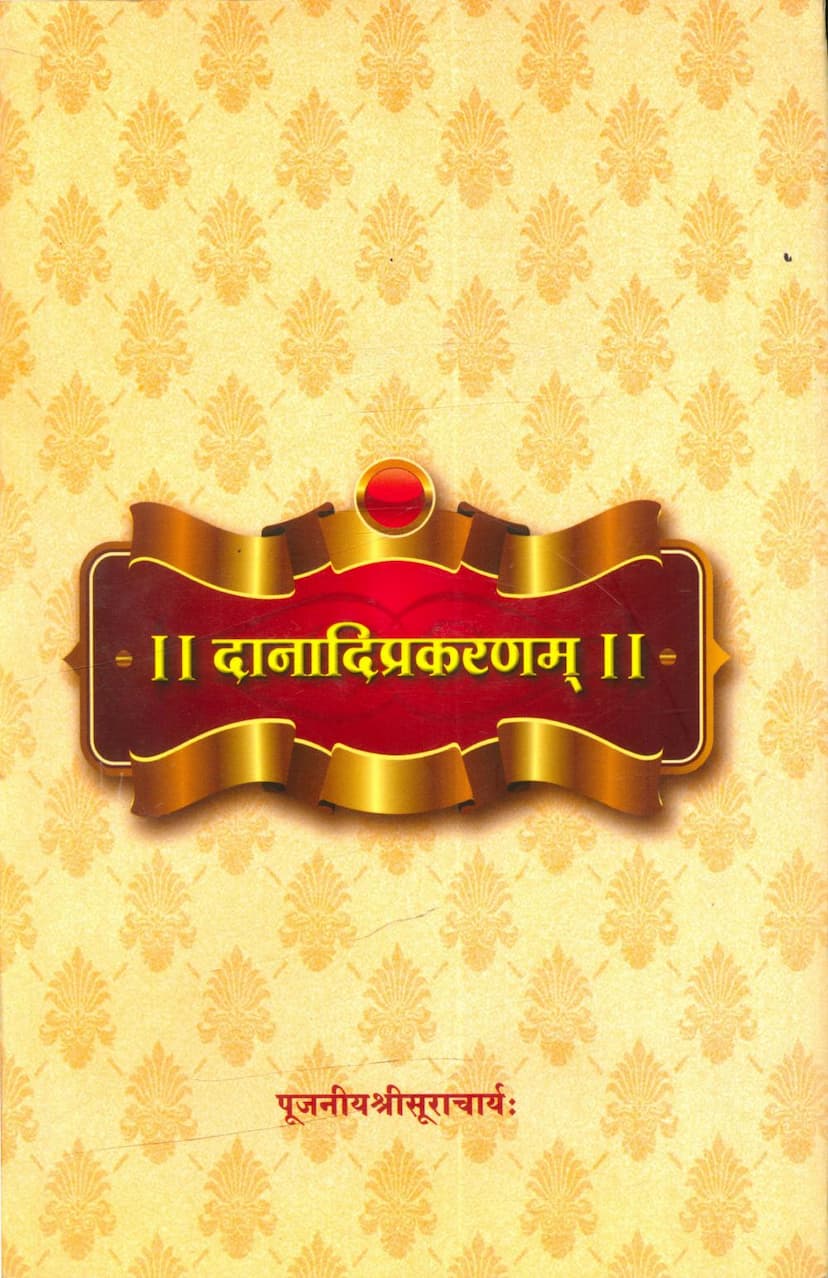Danadi Prakaranam
Added to library: September 1, 2025

Summary
This is a comprehensive summary of the Jain text "Danaadi Prakaranam" by Suracharya, published by Shree Jinshasan Aradhana Trust.
Book Title: Danadi Prakaranam (दानादिप्रकरणम्) Author: Suracharya (परमपूजनीय श्रीसूराचार्यविरचितम्) Editor/Commentator: Acharya Vijay Kalyanbodhisurishwarji (प्राचीन श्रुतोद्धारक प.पू. आचार्यदेव श्रीमद्विजयहेमचन्द्रसूरीश्वरशिष्या आचार्यविजयकल्याणबोधिसूरीश्वराः) Publisher: Shree Jinshasan Aradhana Trust (श्री जिनशासन आराधना ट्रस्ट)
Overall Theme: The "Danadi Prakaranam" is a significant Jain text that extensively discusses the importance and various aspects of Daan (Charity/Giving), along with related virtues and devotional practices. It emphasizes the profound impact of giving on spiritual growth, worldly well-being, and ultimately, liberation.
Key Topics and Structure:
The text is divided into seven "Avasaras" (Chapters/Sections), each focusing on different facets of Daan and related principles.
- First Avasara: Discusses the general significance of Dharma (Righteousness) and good deeds. It highlights how practicing Dharma leads to both material and spiritual happiness, ultimately culminating in the attainment of the Siddha pada (state of liberation).
- Second Avasara: Focuses extensively on Gyan Daan (Charity of Knowledge). It asserts that knowledge donation is supreme among all forms of charity. It explains the necessity of knowledge for spiritual development, the purification of mind, speech, and body through knowledge, the importance of the knowledge-guru, and the proper way to acquire knowledge through humility and respect. It also praises scholars and urges for action, enumerates the benefits of knowledge, emphasizes the importance of the thirst for knowledge, and illustrates the futility of a life without knowledge.
- Third Avasara: Deals with Abhay Daan (Charity of Fearlessness). It categorizes living beings, asserts the universal desire for life in all beings, and outlines the negative consequences of violence. It advises compassion towards all living beings, explaining the virtuous deeds arising from compassion and the auspicious outcomes they bring.
- Fourth Avasara: Provides a detailed description of Anna Daan (Charity of Food). It also mentions donations related to the consecration of Jin temples, idols, and the preservation of scriptures. Offering food to those in need and the resulting auspicious outcomes are discussed. The text states that donating wealth for constructing temples, installing idols, and preserving scriptures liberates the donor from the cycle of birth and death. It recommends building Jin temples and outlines their benefits. The significance of installing and consecrating idols is also highlighted, along with the merits of worshipping Jin idols with offerings like ornaments, water, and sandalwood. The importance and benefits of Rathyatra (chariot procession) are also mentioned. An emphasis on inner purity is also noted.
- Fifth Avasara: Discusses the Agamas (Jain scriptures) as the teachings of the Vitaragas (those free from attachment and aversion), the omniscient beings. It refutes the Mimansak belief of "Mariya Veva" (certain rituals being essential). The text emphasizes the importance of preserving and protecting Jin Vachanas (teachings) and the Agamas. It elaborates on Anekantavada (Doctrine of Manifold Aspects), truth, and karma theory. It dispels the notion that scriptures like logic and grammar are not religious texts, and encourages the reading and preservation of non-Jain scriptures as well.
- Sixth Avasara: Highlights the significance of Jin's injunctions (Jina Agna) and the benefits of their observance. It declares the greatness of Jain monks, advises against discrimination even towards lax monks, and outlines the negative consequences for those who discriminate. It preaches compassion for fellow Dharma followers, lists the disadvantages of possessions, praises Jain monks who have renounced all possessions, and emphasizes the need to consider their requirements. It also recommends donating food, etc., to the poor.
- Seventh Avasara: Addresses and rebukes those who oppose charity. It refutes the notion that Jin Puja (worship of Jin) involves violence, and reveals the benefits of Jin Puja. It advocates for religious activities despite minor violence and emphasizes the importance of reverence towards Jain monks.
Author and Context:
- Suracharya is presented as a respected figure, with a historical context potentially placing him in the 11th century. The text mentions his composition of "Nemicharitramahakavya" in Vikram Samvat 1090, suggesting "Danadi Prakaranam" was likely composed in the last two decades of the 11th century.
- The text discusses the historical context of Chaityavasis (monks residing in temples) who found the strict adherence to Agamic principles difficult, leading to a gradual relaxation of rules. This led to opposition from a group of monks in the 11th century who advocated for strict adherence to the Agamic monastic life. The text notes that Suracharya's work sometimes favors the Chaityavasis but also expresses great respect for monks living strictly according to the Agamas.
- The author's time also saw some individuals who preached against the practice of charity, indicating a contemporary debate on the subject.
- The text draws upon and references other Jain scriptures and traditions, including Umaswati's works and the Bhagavad Gita.
Key Strengths and Features:
- Comprehensive Coverage: The text thoroughly explores various forms of charity and their spiritual and material benefits.
- Emphasis on Knowledge and Compassion: It places a high value on "Gyan Daan" and "Abhay Daan," highlighting their transformative power.
- Devotion and Reverence: It stresses the importance of devotion to the Tirthankaras, the Sangha, and Gurus.
- Practical Guidance: The text offers practical advice on how to perform charity and conduct oneself righteously.
- Historical Context: It provides insights into the socio-religious landscape of Jainism during Suracharya's time.
- ** Scholarly Editing:** The published version has undergone extensive work, including the completion of incomplete verses, translation, and editing by Acharya Vijay Kalyanbodhisurishwarji, making the ancient text accessible.
Overall Significance:
"Danadi Prakaranam" is a valuable text for understanding the Jain perspective on charity, ethics, and spiritual discipline. It serves as a guide for adherents on how to lead a life of virtue, contribute positively to society, and progress on the path to liberation. The dedication and commentary by Acharya Vijay Kalyanbodhisurishwarji ensure its relevance and accessibility to modern readers.